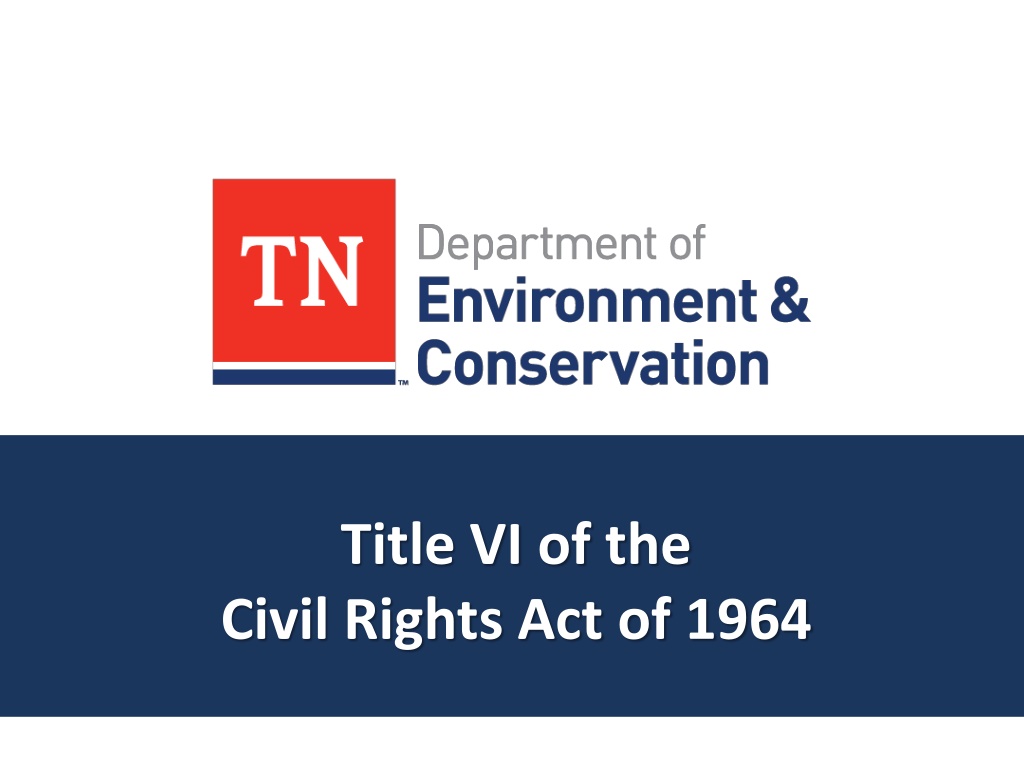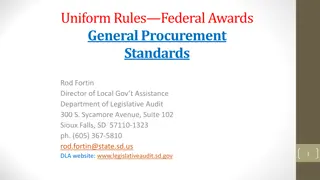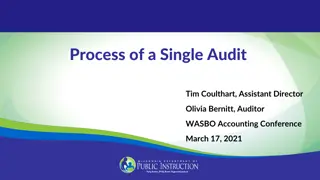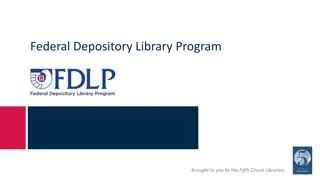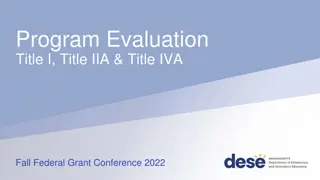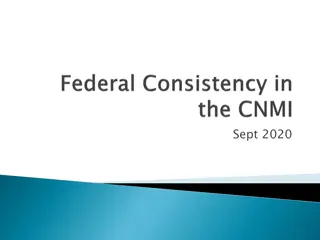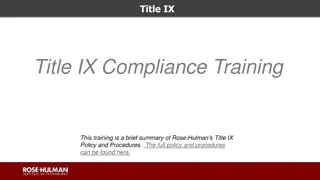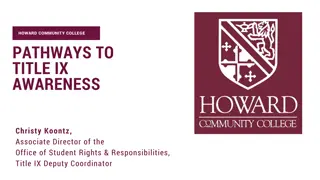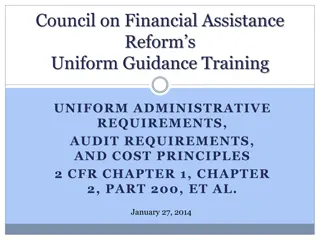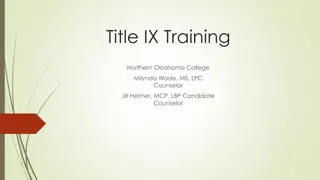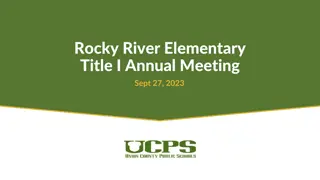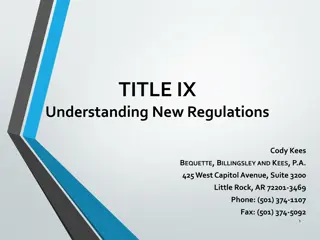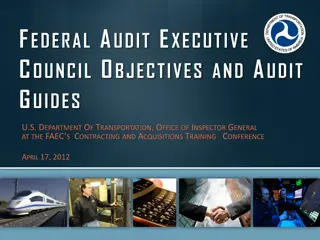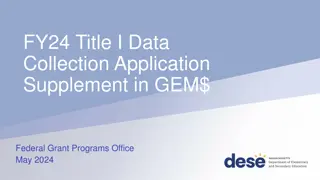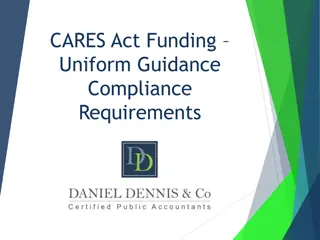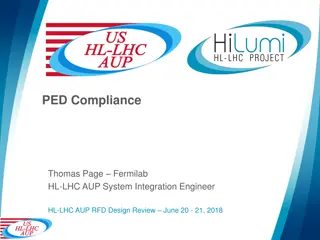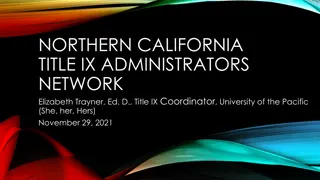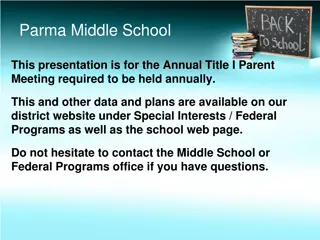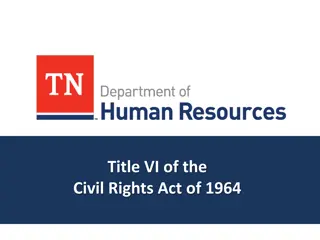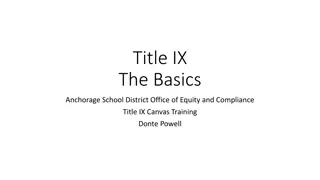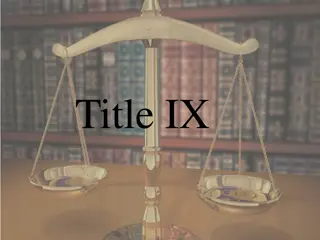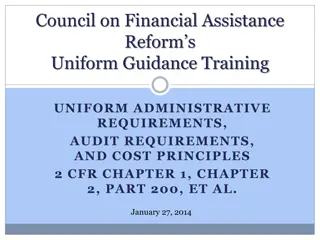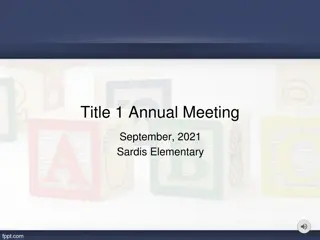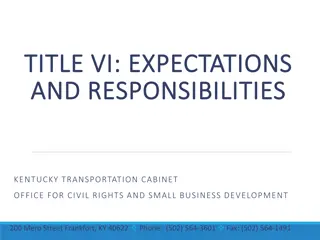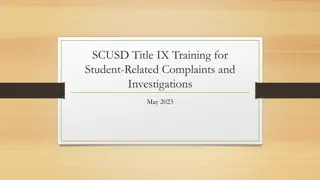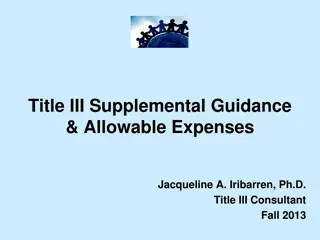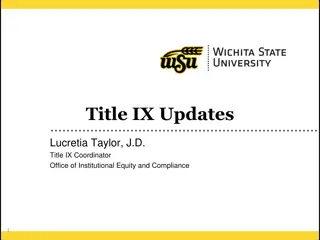Compliance with Title VI Federal Requirements by TDEC
Title VI of the Civil Rights Act of 1964 prohibits discrimination on the basis of race, color, or national origin in programs receiving federal financial assistance. Tennessee Department of Environment and Conservation (TDEC) ensures compliance with Title VI by appointing coordinators, providing training, developing policies, monitoring contractors, and informing the public. Compliance includes various steps such as surveys, audits, and dissemination of information through various channels.
Download Presentation

Please find below an Image/Link to download the presentation.
The content on the website is provided AS IS for your information and personal use only. It may not be sold, licensed, or shared on other websites without obtaining consent from the author. Download presentation by click this link. If you encounter any issues during the download, it is possible that the publisher has removed the file from their server.
E N D
Presentation Transcript
Title VI of the Civil Rights Act of 1964
What is Title VI? Federal Law (42 U.S.C. 2000d): Title VI of the Civil Rights Act of 1964 ensures that no person in the United States shall, on the grounds of race, color or national origin, be excluded from participation in, be denied the benefit of, or be subjected to discrimination under any program or activity receiving federal financial assistance. TN Law Tennessee Code 4-21-904; May 31, 1993.
How Title VI (federal law) Applies to TDEC (state agency) EPA Title VI Requirements (federal government agency) FHWA Title VI Requirements (federal government agency) (e.g., loan, grant, tax exemption, assistance, surplus property, etc.) (e.g., loan, grant, tax exemption, assistance, surplus property, etc.) Financial Assistance Financial Assistance TDEC (state agency) TDEC (state agency) Pass Through of Funds (Financial Assistance) (e.g., loan, grant, procurement contract, etc.) Pass Through of Funds (Financial Assistance) (e.g., loan, grant, procurement contract, etc.) MailPro (contractor) Tinytown (grantee) or City of Athens (grantee)
How TDEC Currently Works To Comply with Title VI Federal Requirement (DOJ and EPA) TDEC Implementation Appoint Title VI coordinator and program liaison TDEC Title VI Coordinator position in Office of Policy and Planning Annual Title VI training required for all TDEC employees Provide Title VI training for employees at all levels Title VI Intranet site Develop a Title VI policy statement and post in visible areas Title VI posters placed on employee bulletin boards throughout TDEC offices and available on Intranet Include Title VI assurances in contracts/grants and acquire signed assurances from contractors/grantees Standard nondiscrimination and assurance language in grants and contracts Monitoring ethnicity of contractors and subcontractors Information collected by Procurement Title VI pre-audit survey upon submission of application for funding (grants management system) Pre- and post-award compliance Post-award sub-recipient Title VI self-survey Audit checklist inclusive of Title VI elements Title VI Internet page Inform customers about Title VI and disseminate information to public via website, poster, newspaper, customer interactions, etc. External online training Posters placed on bulletin boards Employee interactions with customers
Examples of Title VI Violations Restricting an individual in any way in the enjoyment of services, facilities or any other advantage, privilege or other benefit provided to others o Example: Denying Asian Americans and Hispanic Americans the right to reserve available meeting rooms at Henry Horton State Park, but permitting white Americans and black Americans to reserve available meeting rooms. Failure to provide service or information in a language other than English where significant numbers of potential or actual beneficiaries are of limited English speaking ability o Example: Failure to provide language translation assistance to Hispanic persons with limited English proficiency who are seeking wastewater treatment operators training and certification at Fleming Training Center.
TDECs Written Title VI Complaint Process and Log Complaint must be filed within 180 days of the alleged occurrence or when the alleged discrimination became known to the complainant. Complaints filed against the contractor (doing business with TDEC) or sub-recipient (who is recipient of funding from TDEC) should be forwarded to TDEC for investigation. Upon receipt of complaint, TDEC determines the jurisdiction, acceptability, and the need for additional information to investigate the merit of the complaint. Following investigation, TDEC takes final action within 60 days and provides decision and appeal instructions to the complainant. Complaints should be forwarded to: TDEC Title VI Coordinator William R. Snodgrass Tennessee Tower 312 Rosa L. Parks Blvd., 2nd Floor Nashville, TN 37243 TDEC.TitleVI@tn.gov
Title VI Noncompliance Consequences Withholding of payments to TDEC under the grant or contract until compliance achieved; and/or Cancellation, termination or suspension of TDEC s grant or contract, in whole or in part. TDEC s receipt of federal funding is contingent upon Title VI compliance. Thus, it is extremely important for all TDEC staff to assist with compliance.
Ensuring Compliance: Nondiscrimination TDEC must ensure that all contractors, sub- contractors, and sub-recipients awarded TDEC funded contracts and grants adhere to Title VI and all other applicable civil rights laws and regulations. Mandatory Title VI resources and policies include: Strategy for board diversity Written non-discrimination policy Limited English Proficiency (LEP) policy Title VI training materials, poster, and complaint review process
Ensuring Compliance: Environmental Justice EPA defines environmental justice as, the fair treatment and meaningful involvement of all people regardless of race, color, national origin, or income with respect to the development, implementation, and enforcement of environmental laws, regulations, and policies. EPA further defines fair treatment to mean that no group of people should bear a disproportionate burden of environmental harms and risks, including those resulting from the negative environmental consequences of industrial, governmental, and commercial operations or programs and policies. http://www.epa.gov/environmentaljustice/
Executive Order 12898 Federal Actions to Address Environmental Justice in Minority Populations and Low-Income Populations E.O. 12898 called on each covered Federal agency to make achieving environmental justice part of its mission by identifying and addressing, as appropriate, disproportionately high and adverse human health or environmental effects of its programs, policies, and activities on minority populations and low-income populations. The term effects is typically interpreted within the EPA as a reference to risks, exposures, and outcomes and is sometimes used interchangeably with the term impacts. E.O. 12898 is legally grounded in Title VI, the E.O. clearly states that it is non-binding and does not create any judicially enforceable rights or obligations.
What is TDECs EJ Responsibility? EPA has regularly called on states to consider environmental justice throughout all its programs, policies and activities. TDEC reviews permit applications in accord with its statutory and regulatory authority and based upon technical information submitted by the applicant as well as the technical expertise of our staff. Other factors that may arise with permit applications, such as geographic location or potential permit limitations that may be beyond TDEC s authority. The majority of environmental justice concerns confronted by TDEC are based upon complaints about the location of the proposed or existing facility. The agency cannot factor consideration of location into its permitting decisions unless it has the legal authority to do so.
Ensuring Compliance: Public Participation Engage the public to raise awareness of TDEC projects or services and to provide stakeholders with the meaningful opportunity to provide input during the decision-making process. Public Meetings/Hearings in centralized locations Advertisement with Local Media Resources and Minority Newspapers Website Information Posters Public participation is applicable throughout the Department and impacts the work of all Bureaus and Boards.
Ensuring Compliance: Limited English Proficiency (LEP) Individuals who do not speak English as their primary language and who have a limited ability to read, speak, write, or understand English are of limited English proficiency, or LEP. These individuals may be entitled to language assistance with respect to a particular type of service, benefit, or encounter. LEP is a component of Title VI E.O. 13166 clarifies the existing requirements to serve LEP persons under Title VI Treating people differently based on English language ability can be a type of national origin discrimination. T.H.R.C. Rule 1500-01-03-.08(a)(7) Requires all State of Tennessee executive branch departments and agencies to have an LEP policy and procedure.
TDEC LEP Policy and Process Provide language assistance at no cost to the customer Preferred option: Contracting with a telephone interpreter service (State of Tennessee) Other options (limited circumstances) must be well- documented: Hiring bi-lingual Staff for client contact positions or staff interpreters Contracting for interpreter services Engaging community volunteers Ensures meaningful access to programs and activities by LEP persons Assists in achieving environmental justice o o o
Questions? Christina Guidry Tennessee Department of Environment and Conservation Office of Policy and Planning William R. Snodgrass Tennessee Tower 312 Rosa L. Parks Blvd., 2ndFloor Nashville, TN 37243 (615) 253-8337 TDEC.TitleVI@tn.gov http://www.tn.gov/environment/topic/opsp-title-vi-and-environmental-justice
